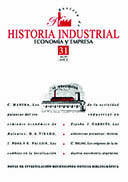Merit and problems of the pioneer companies of electricity: Arteta, 1893/98-1961
Keywords:
Historia empresarial, Industrialización, Empresas Eléctricas, Mercados EléctricosAbstract
This paper’s objective is to take a more in-depth look at, and encourage debate on, the mechanism that were in force in the birth, growth and crisis of traditional electrical systems. The merit of Arteta, as with other SMEs in the electrical sector, resided in its ability to provide, almost from the outset (1896), the benefits of hydroelectricity. This supply was aimed at towns that and been ignored by the larger Spanish providers due to their not being sufficiently industrialized or urbanized (as was the case of Pamplona). When these firms agreed to integrate the peripheral electrical systems in the mid-20th century, they inherited a series of consumer markets which, though mature, were poorly attended to in terms of the quantity and quality of the service provided. In this sense, the history of Arteta shows the many production drawbacks this type of electrical company had to face in order to satisfy a growing demand. Something that was particularly true when, in a scenario of competitive or cartelized markets, they adopted merely defensive strategies to avoid being ousted from the marketDownloads
Published
How to Cite
Issue
Section
License
The author assigns all rights to the publisher. Creative Commons
The author who publishes in this journal agrees to the following terms:
- The author assigns all intellectual property rights exclusively to the publisher for the entire duration of the applicable intellectual property rights.
- The publisher will distribute the texts under the Creative Commons Attribution License, which allows others to share the work, provided that they acknowledge the authorship, its initial publication in this journal, and the conditions of the license.





